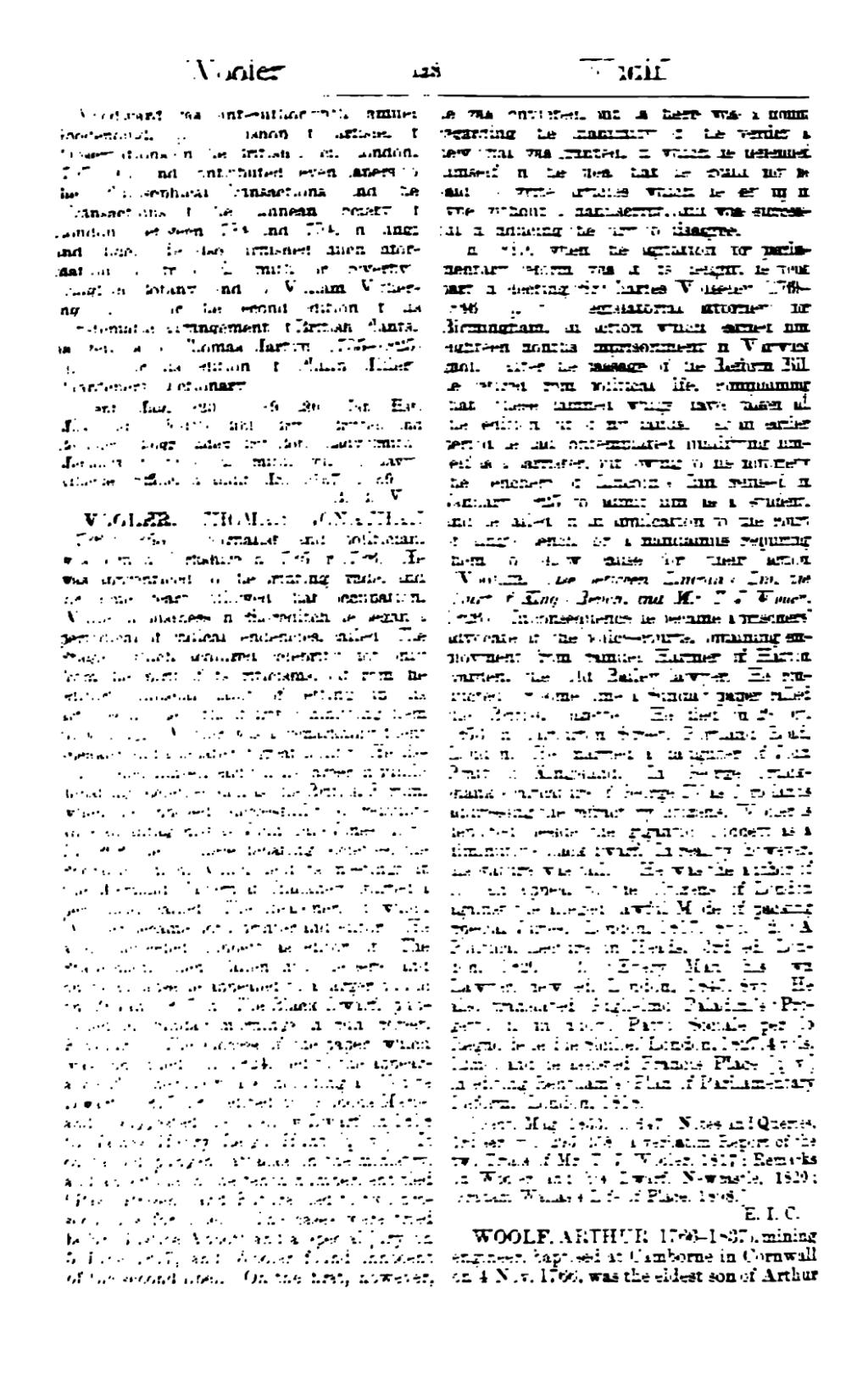Woodward was joint-author with Samuel Goodenough [q. v.], bishop of Carlisle, of ‘Observations on the British Fuci,’ London, 1797, 4to, and contributed seven papers to the ‘Philosophical Transactions’ and the ‘Transactions of the Linnean Society of London’ between 1784 and 1794, on fungi and algæ. He also furnished much information to Sir J. E. Smith for Sowerby's ‘English Botany,’ and to William Withering [q. v.] for the second edition of his ‘Systematic Arrangement of British Plants,’ as well as to Thomas Martyn (1735–1825) [q. v.] for his edition of Philip Miller's ‘Gardeners' Dictionary.’
[Gent. Mag. 1820, i. 189, 280; Nat. Hist. Mus. Cat.; Watt's Bibl. Brit.; Britten and Boulger's Biogr. Index Brit. Bot.; Lady Smith's Memoirs of Sir J. E. Smith, vol. i.; Davy's Athenæ Suffolc. in Addit. MS. 19167, f. 169.]
WOOLER, THOMAS JONATHAN (1786?–1853), journalist and politician, was born in Yorkshire in 1785 or 1786. He was apprenticed to the printing trade, and for some years followed that occupation. While in business in Shoreditch he began a periodical of radical tendencies, called ‘The Stage,’ which acquired celebrity not only from the spirit of its criticisms, but from the editor's unusual habit of setting up his articles in type without first committing them to writing. Wooler was a remarkably fluent speaker, and a debater of great ability. He distinguished himself early in his career in public debating societies such as the British Forum, when he opposed successfully so redoubtable an antagonist as John Gale Jones [q. v.] In 1808 one of these debating societies, the Socratic Union, which held its meetings at the Mermaid Tavern at Hackney, started a periodical called ‘The Reasoner,’ of which Wooler became both printer and editor. He also succeeded Cobbett as editor of ‘The Statesman,’ then ‘fallen into the sere,’ and on its collapse he appealed to a larger public on 29 Jan. 1817 in ‘The Black Dwarf,’ published on Sunday mornings in Sun Street, Finsbury. The success of the paper, which was continued till 1824, led to the appearance of numerous rivals, including a ‘White Dwarf’ (1817–18), edited by Gibbons Merle, and it suggested the ‘Yellow Dwarf’ in 1818 to James Henry Leigh Hunt [q. v.] It contained pungent attacks on the ministry, and an article in the tenth number, entitled ‘Past, Present, and Future,’ led to two prosecutions for libel. The cases were tried before Justice Abbott and a special jury on 5 June 1817, and Wooler found innocent of the second libel. On the first, however, he was convicted, but as there was a doubt regarding the unanimity of the verdict a new trial was granted, in which he defended himself on the plea that he could not be said to write articles which he set up in type without a manuscript, and was successful in inducing the jury to disagree.
In 1819, when the agitation for parliamentary reform was at its height, he took part in electing Sir Charles Wolseley (1769–1846) [q. v.], ‘legislatorial attorney’ for Birmingham, an action which earned him eighteen months' imprisonment in Warwick gaol. After the passage of the Reform Bill he retired from political life, complaining that ‘these damned whigs have taken all the sedition out of my hands.’ At an earlier period he had contemplated qualifying himself as a barrister, but owing to his notoriety the benchers of Lincoln's Inn refused in January 1825 to admit him as a student, and he failed in an application to the court of king's bench for a mandamus requiring them to show cause for their action (Wooler, Case between Lincoln's Inn, the Court of King's Bench, and Mr. T. J. Wooler, 1826). In consequence he became a prisoners' advocate at the police-courts, obtaining employment from Samuel Harmer of Hatton Garden, the Old Bailey lawyer. He conducted for some time a Sunday paper called the ‘British Gazette.’ He died on 29 Oct. 1853 in Carburton Street, Portland Road, London. He married a daughter of John Pratt of Kingsland. In George Cruikshank's caricature of George IV as Coriolanus addressing the refractory citizens, Wooler is depicted beside the gigantic Cobbett as a diminutive black dwarf. In reality, however, his stature was tall. He was the author of 1. ‘An Appeal to the Citizens of London against the alleged lawful Mode of packing Special Juries,’ London, 1817, 8vo. 2. ‘A Political Lecture on Heads,’ 3rd ed. London, 1820. 3. ‘Every Man his own Lawyer,’ new ed. London, 1845, 8vo. He also translated Guglielmo Paladini's ‘Progetto di un nuovo Patto Sociale per lo Regno delle due Sicilie,’ London, 1827, 4 vols. 12mo, and he assisted Francis Place [q. v.] in editing Bentham's ‘Plan of Parliamentary Reform,’ London, 1818.
[Gent. Mag. 1853, ii. 647; Notes and Queries, 3rd ser. viii. 295, 358; a verbatim Report of the two Trials of Mr. T. J. Wooler, 1817; Remarks on Wooler and his Dwarf, Newcastle, 1820; Graham Wallas's Life of Place, 1898.]
WOOLF, ARTHUR (1766–1837), mining engineer, baptised at Camborne in Cornwall on 4 Nov. 1766, was the eldest son of Arthur
